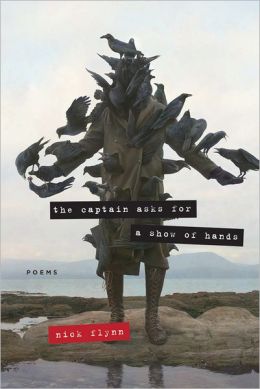Review: THE CAPTAIN ASKS FOR A SHOW OF HANDS by Nick Flynn

Review by THEODORA ZIOLKOWSKI
Nick Flynn’s latest collection of poems, The Captain Asks for a Show of Hands, is a chilling journey from beginning to end, in which the unmoored urgently pursue forms of connection—to the self or to any reality they can grasp. Deep-seated in American culture, the poems are conveyed through the fragmentary voices of American soldiers in Iraq at Abu Ghraib, and reference or draw lines from other art forms and their makers— from Britney Spears to Arcade Fire. The pulse at work in these poems is one of muddled obligation to the greater power that The Captain represents and, alternatively, clarity. As we read further into Flynn’s latest work, we come closer to understanding the intricacies of war, getting tangled as we go.
The Captain Asks for a Show of Hands is organized into three sections, the first and second of which explore the four elements: fire, air, earth, water. Each of these element-related poems begins after over half of a page of white space—a long breath before the words form in quick, successive lines, drawing the reader into the poems’ obligatory and often frantic acts of witness. As with “fire,” the narrator speaks to The Captain in these same frantic breaths: “here’s the part, capt’n, where I tell a story/as if it were a confession.” Accordingly, the unspeakable that the voice in this poem is attempting to communicate is spoken—with overwhelming directness.
The text’s recurring theme—the struggles and failures to make connection—can be noted in the prose poems placed throughout the book’s three other sections. Unlike the elemental poems, the dashes that interrupt the compact block of text in “false prophet,” “baffled king composing hallelujah,” “pulse (hidden bird)” and others, build a nearly airless, tight space, a subsequent gasping quality. In these prose poems, Flynn’s speakers seem at the mercy of the direct quality of speech they attempt to master. In the first lines of the collection’s opening prose poem, “haiku (failed),” for instance, the speaker loses himself in reiteration and doubt in a form that is anything but a traditional haiku:
The thin thread that holds us here, tethered/or maybe tied, together, who/do you call it — telephone? horizon? song? Listen/to yourself sing, We are all god’s children/ we are all gods, we walk the earth/
Immediately after these lines, the human body is likened to a bottle, which works to ground the body in both the contemporary world/the world of the telephone, as well as affirm our fundamental relationships to others, thus creating that connection.
Flynn often uses the body to illustrate the unseen effects of war and the struggles of connection. In “air” the psychological effects of war are shaped into the physical experiences of the bodies, “we feed them with tubes their vitals are good/it helps to think it’s a game” and later, in “fire,” the inter-connectivity and subsequent disconnection from the body are likened to birth. Further along in the collection, in “self-exam (my body is a cage),” the soldiers succumbs to the biological need to connect to the abstract self within ourselves:
…we think hungry
children live in our bellies, clutching their empty
bowls as the food rains
down, we sometimes think we are those
hungry children…
Thus, the human body becomes a testament to the restriction of the psyche.
Throughout The Captain Asks for a Show of Hands, the energy and arrangement of lines work to full potential. The lineation of the poems—the surprises when there are no breaks, and the words flow urgently together—propel our reading, heightening the sense of urgency Flynn builds in these poems.
At the heart of this labyrinth are the voices—the innocents and the transgressors; the witnesses and the witnessed—that either build or break down walls. This image of a cage—of being caged and the act of caging—appears obsessively throughout Flynn’s collection and through his intense repetition of themes and imagery. Through the surging rhymes of nursery songs we hear the damages of war mount.
The cages and borrowed language from pop culture are not the only reiterations we see though. The manuscript’s title emerges from a poem in Flynn’s first book, Some Ether, which addresses a mother’s suicide and the emotional devastation and concurrent emotional disconnectedness the son faces as her survivor. Unlike the captain in Flynn’s previous collection, the captain who pervades the backdrop of The Captain Asks for a Show of Hands waits for no one; he is the silent head that all below turn to. The Captain’s reappearance, and ensuing transformation in Flynn’s latest collection of poems, emphasizes Flynn’s thematic reworking of language. The poem, “earth,” for instance, once again illustrates the invisible power that The Captain represents as the speaker of the poem appeals to him:
capt’n: the memo says we cannot bury
the prisoner, but does that mean we can bury his
son? I mean, does it say we can pretend to bury his son?
By reusing the character of the captain as the prevailing backdrop in this collection, Flynn continues to pull from the omniscient energy of Walt Whitman’s “O Captain! My Captain!” Consequently, as in Some Ether, while the captain plays as a further layer of witness in The Captain Asks for a Show of Hands, he also brings the daunting, cyclical weight of history and literary tradition to the collection.
Flynn’s most recent collection of poems stresses the impression that the actions made manifest by war leave on the human psyche and our own understanding of human authority and the overall ego of a nation. The Captain Asks for a Show of Hands offers a vivid sequence of contemporary American perceptions shattered by the Iraq war and, likewise, a lingering reflection of the power our mind and bodies have over other bodies, as well as our own.